A Study of Acts: The Ship is Blown Off Course and Paul has a Vision
Acts 27:14-26 - BELIEVE God when you are caught in the storms of life. And pray for others (loved ones, friends, strangers and enemies) because God will hear!
“But before very long there rushed down from the land a violent wind, called Euraquilo; and when the ship was caught in it and could not face the wind, we gave way to it and let ourselves be driven along. Running under the shelter of a small island called Clauda, we were scarcely able to get the ship’s boat under control. After they had hoisted it up, they used supporting cables in undergirding the ship; and fearing that they might run aground on the shallows of Syrtis, they let down the sea anchor and in this way let themselves be driven along.
The next day as we were being violently storm-tossed, they began to jettison the cargo; and on the third day they threw the ship’s tackle overboard with their own hands. Since neither sun nor stars appeared for many days, and no small storm was assailing us, from then on all hope of our being saved was gradually abandoned. When they had gone a long time without food, then Paul stood up in their midst and said, “Men, you ought to have followed my advice and not to have set sail from Crete and incurred this damage and loss. Yet now I urge you to keep up your courage, for there will be no loss of life among you, but only of the ship. For this very night an angel of the God to whom I belong and whom I serve stood before me, saying, ‘Do not be afraid, Paul; you must stand before Caesar; and behold, God has granted you all those who are sailing with you.’ Therefore, keep up your courage, men, for I believe God that it will turn out exactly as I have been told. But we must run aground on a certain island.””
Acts 27:14-26 NASB1995
The ship is driven away almost immediately from its coastal route along Crete by the sudden appearance of a violent wind called the Euraquilo. So what is this type of wind? Here is the definition, according to Wikipedia:
Euroclydon (or in Latin: Euroaquilo) is a cyclonic tempestuous northeast wind which blows in the Mediterranean, mostly in autumn and winter. It is the modern Gregalia (Gregale) or Levanter. From the Ancient Greek word: εὐροκλύδων, romanized: eurokludōn, from Euros (Eurus, meaning 'east wind') and either the Ancient Greek word: akulōn akylōn, meaning 'north wind'), or kludon (referring to a surging wave from the verb kluzo meaning to billow) or the Latin word: aquilō(aquilon). Euroclydon is not to be confused with the term "nor'easter", which is a separate storm system that forms in the northeastern portion of the United States.
The crew had no choice but to give way to the storm and let it drive the ship along. The small boat behind the ship was brought on board with difficulty and they put supporting cables to undergird the ship because they were now in a shallow area of the southern Mediterranean known as Syrtis, an area that is full of sandbars and other hazards. This is in the gulf of Sidra off the coast of current-day Libya. The crew also put the ship anchor down to likely slow the momentum, but still allow them to be driven along. John MacArthur noted in commentary in Precept Austin that lowering the anchor without also bringing down the mainsail would be disastrous, so that was also likely done. This Syrtis area is shown on the map below that was found on Precept Austin:
The next day, the ship was still being violently tossed around by the storm, so the crew began jettisoning cargo. On the third day, they threw the tackle overboard and Luke notes that from that point on, all hope of being saved was abandoned. Food appears to be gone or at least not accessible, and there has been no hope seeing the sun or stars. At this point, Paul speaks up saying that he had warned them of the dangers of leaving the Fair Havens harbor (some commentators say that he was just reminding them of his previous concerns, but I think this also seems a little bit like “I told you so” because they didn’t listen to him).
From a personal perspective, being on a ship during an incredibly powerful storm is quite nerve-wracking. We were on a fairly small cruise ship in 2014 trying to sail from Bermuda to Charleston, South Carolina. A huge storm came up with westerly winds hindering our forward progression. The passengers were advised to stay in their cabins because of the 25+ foot waves (they were likely higher than that), the elevators were locked off, and no one was allowed out on any exterior deck (verandas were ok, if you could open the door safely); we had sandwiches delivered to the room for dinner. One elderly passenger fell and broke his leg trying to get into the hot tub in his suite and there may have been other injuries. We don’t get seasick, but the noise during that storm was unforgettable and of course we didn’t make it to Charleston. The ship diverted to Port Canaveral, Florida, south of the storm, needing a nearby port to take off the injured passengers. Here are some pictures from that adventure:
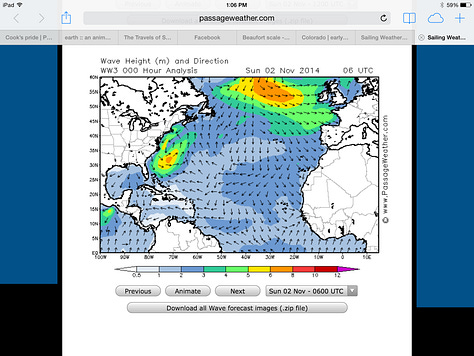
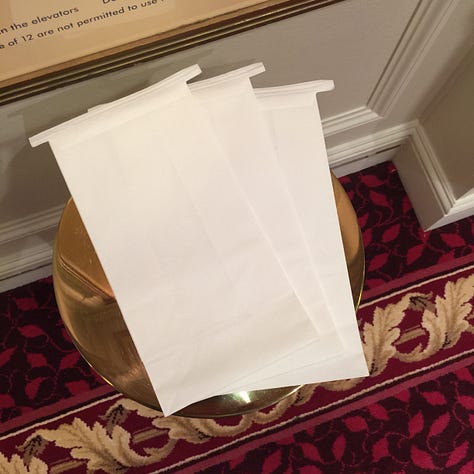
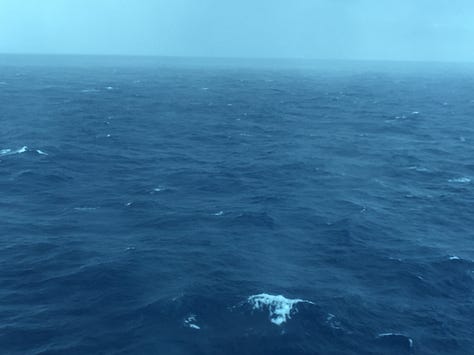
Back to our passage, Paul does have incredible words of hope for those on this Roman cargo ship, however, telling them that on that very night an angel from the God that he serves appeared to him and said , ‘Do not be afraid, Paul; you must stand before Caesar; and behold, God has granted you all those who are sailing with you.’ Paul tells the men to have courage and believes God that it will turn out exactly as he was told. However, he also tells them that the ship will run aground on a certain island (the island name was not revealed to Paul). Here is a great commentary on this passage from Enduring Word:
a. There stood by me this night an angel: God sent an angelic messenger to Paul to bring good, encouraging news when all else seemed hopeless. This wasn’t a direct appearance of Jesus (as in Jerusalem, Acts 23:11), but of an angel. God’s word came to Paul different ways at different times.
b. An angel of the God to whom I belong and whom I serve: The angelic presence was an encouragement; this was also. Paul remembered that he belonged to God and that he served God. God never forgets those who belong to Him and serve Him.
i. That doesn’t mean everything goes easy for those who belong to God and serve Him. Paul’s present calamity proved that. It does mean that God’s watchful eye and active care is present even in that kind of calamity.
c. Do not be afraid: There was a reason Paul needed to hear this. He was also afraid in the storm (at least some of the time). In his strong moments, Paul knew he would make it to Rome because God promised it. Yet in the storm (here, a literal storm) it was easy to doubt and Paul needed the assurance.
d. Indeed God has granted you all those who sail with you: This implies that Paul sought God for the safety of everyone on the ship. He already had a promise for his own safety, but that wasn’t enough for Paul. He labored in prayer for the safety and blessing of those with him, believers and not-yet-believers. Paul cared for them and loved them, and he labored for them in prayer until God granted the apostle their safety.
e. Therefore take heart, men: Paul encouraged them to take heart just a moment before (Acts 27:22). He repeats the encouragement again, this time in light of the revelation from God. “You have reason to take heart – God has given me assurance of your safety, and I believe God.”
i. Paul couldn’t keep his hope to himself. He had to pass it on to both the believers on board the ship and to those who had not yet believed.
f. I believe God that it will be just as it was told me: Paul’s confident word to the troubled sailors on a storm-tossed ship express the essence of what it means to put our faith in God and His Word. God said it to Paul (through an angel) and Paul said, “I believe God.”
i. Take note of what Paul said: “I believe God.” He didn’t say, “I believe in God.” Every demon in hell agrees with the existence of God. Paul declared his total confidence in God’s knowledge of his situation and His promise in his situation.
ii. Paul believed God when there was nothing else to believe. He couldn’t believe the sailors, the ship, the sails, the wind, the centurion, human ingenuity or anything else – only God. This was not a fair-weather faith; he believed God in the midst of the storm, when circumstances were at their worst. Paul would say along with Job: Though He slay me, yet will I trust Him (Job 13:15). The storm and the danger were real, but God was more real to Paul than the dreadful circumstances.
iii. Paul was not ashamed to say that he believed God. “I would to God that all Christians were prepared to throw down the gauntlet and to come out straight; for if God be not true let us not pretend to trust him, and if the gospel be a lie let us be honest enough to confess it.” (Charles Spurgeon)
iv. Paul’s unshakable confidence in God made him a leader among men, even though he was a prisoner of Rome.
g. However, we must run aground on a certain island: This was mixed news, and in these circumstances to run aground might be fairly called to shipwreck. Paul essentially said, “We’re all going to shipwreck on an unknown island, but everyone will be alright.”
i. A certain island means that God did not tell Paul everything about what was going to happen. Paul had to trust that God knew which island they would run aground on, even if Paul didn’t know.
This is so good. Here are some key takeaways that I gleaned:
We belong to God and serve God, even in a dire personal calamity.
We should not be afraid! We have His assurance, even though the storms may seem insurmountable.
Intercessory prayer works! Paul prayed fervently for all those onboard the ship and God granted them their lives.
Prayer should not be limited to those we love, but to all who may find their way to God through your intercession.
Paul could not keep his assurance and encouragement to himself but had to tell everyone else. Hope is the anchor of faith!
Paul believes God. As Guzik notes in this commentary, even the demons believe in God. I think I’ve explored this distinction before in a long-ago devotional but we must trust in Him and His promises.
Paul believes God and does not believe in anyone else, including the captain, the centurion, the crew or his friends or the weather.
On Precept Austin, Pastor Steven Cole has this great commentary about praying like Paul from two of his sermon sources:
God could have saved Paul, Luke, and Aristarchus, but let the others perish. But instead, He graciously granted to Paul the lives of all on board. The world never knows the protection that it receives because of the presence and prayers of God’s people! Scripture doesn’t tell us how many of those on board eventually came to saving faith in Christ, but I think that many did. Whenever you are going through a storm, not only pray that God will deliver you, but also that He will grant you the souls of others with whom you have contact during the storm. He may be taking you through the storm for the very reason that He wants to use you to bring the gospel to others “on board” with you. The fact that He graciously answers prayer for the salvation of others should encourage us in the storm." (Sermon)
After Paul’s advice not to continue the voyage had been rejected, he easily could have got his feelings hurt and said, “If that’s how they want to be, they deserve to perish!” But he put his feelings aside and prayed that all would be delivered. No doubt these sailors were not nice men with high moral standards. They probably swore a lot, as sailors are notorious for doing. The soldiers guarding Paul and the other prisoners showed their true colors by wanting to kill all the prisoners just prior to the shipwreck. But Paul knew that they all needed the Lord, and so he prayed for them. Even so, we should pray for people in the world who do not deserve God’s grace. None of us do! As we learned in the “Praying for You” seminar several years ago, most unbelievers will respond favorably if you ask, “May I pray for you?” Everyone has needs, and even the most hardened unbelievers will often say, “Well, it can’t hurt!” Your kindness may open a door for the gospel. And with fellow believers who are going through the storm, it will encourage them to know that you are praying for them. (Acts 27:2-3,21-26,33-36 Encouragement in Life’s Storms).
My next devotional examines Acts 27:27-44 - The ship nears land, more items are offloaded, more encouragement comes from Paul, the centurion saves Paul from the soldiers, the shipwreck happens. That will finish Acts 27, with one more book of Acts to study. After that, I plan on having a multipart summary of Acts, then the next Bible book I hope to tackle is the OT book of Daniel, which will be challenging, I’m sure.
Heaven on Wheels Daily Prayer:
Dear Lord - Please help me to believe, pray and be encouraged by Your steadfastness and love for Your sheep. Amen.
Scripture quotations taken from the (NASB®) New American Standard Bible®, Copyright © 1960, 1971, 1977, 1995 by The Lockman Foundation. Used by permission. All rights reserved. lockman.org
Precept Austin was accessed on 2/15/2025 to review commentary for Acts 27:14-26.
Commentary in Enduring Word by David Guzik is used with written permission.



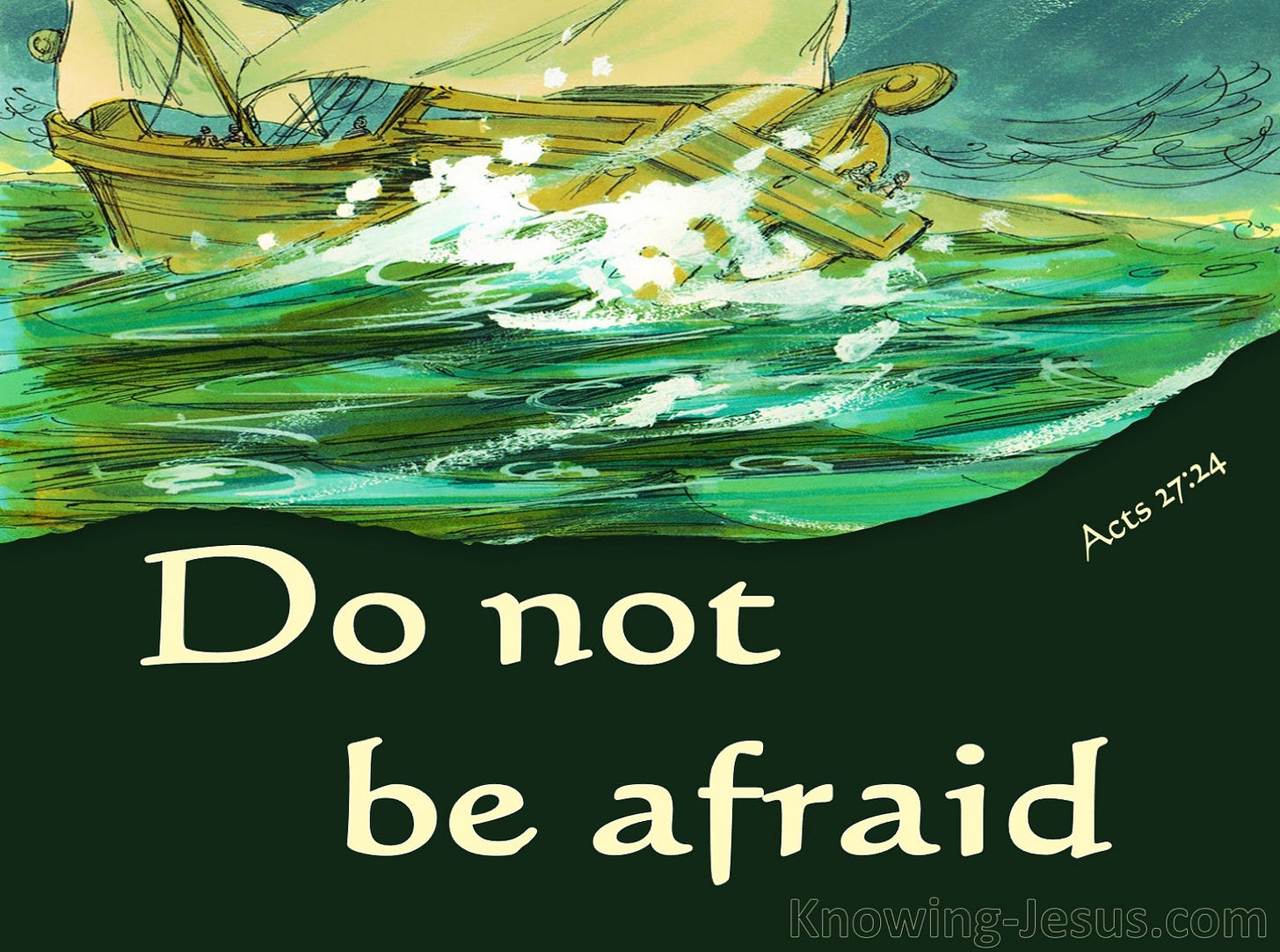
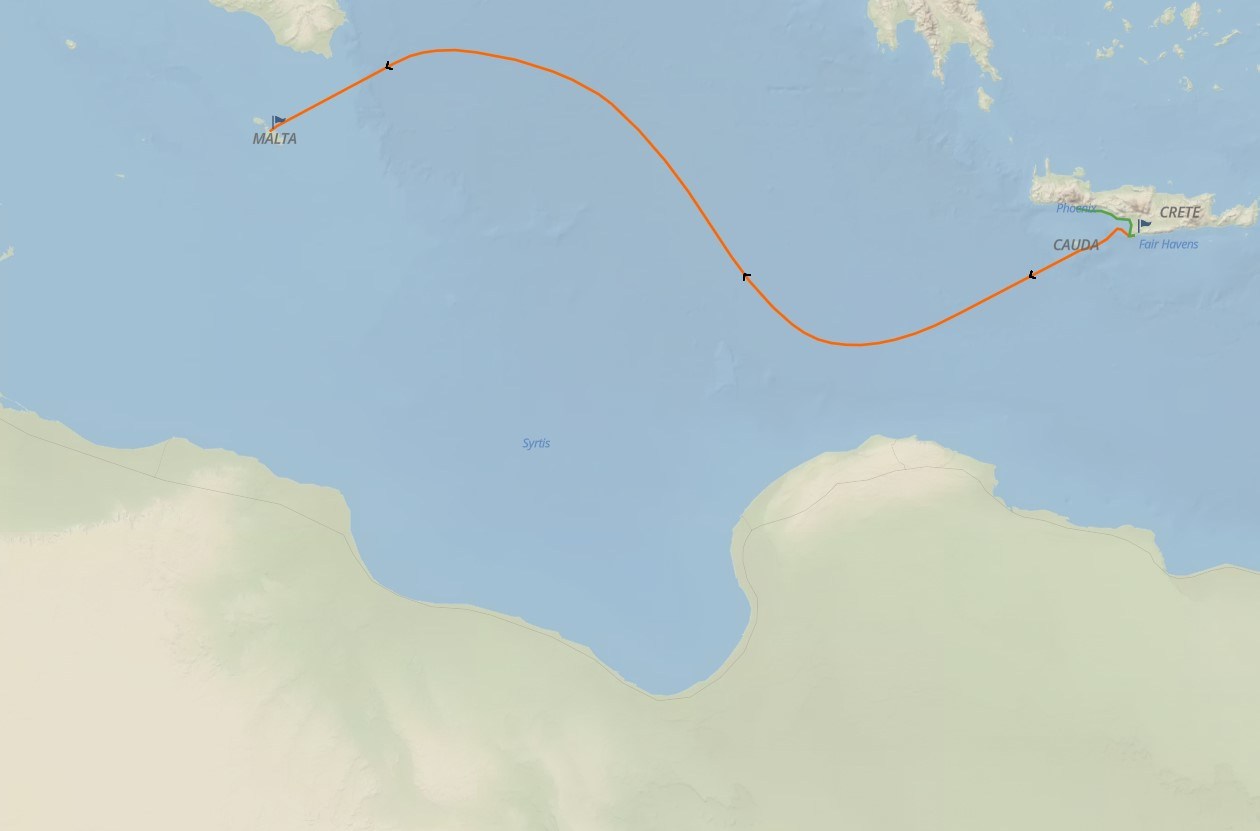
That had to be a scary trip for you. I get seasick easily and would have suffered, I'm sure. God is always there to protect us. It was interesting seeing the map of Paul's trip. Thanks for sharing. 😊